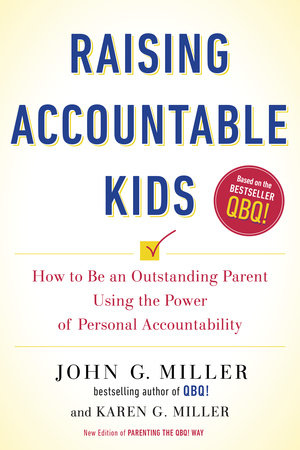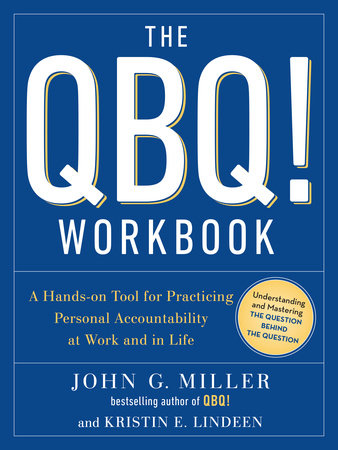Beyond the Naughty and Nice List: Keeping Kids on Their Best Behavior At the Holidays and All Year Round
by John G. Miller and Karen G. Miller with Kristin E. Lindeen
Editor’s Note: The following article is written by John and Karen Miller, with the help of their daughter, Kristin Lindeen. John is the bestselling author of QBQ! The Question Behind the Question. Together, he and his wife have applied the personal accountability principles of QBQ! to family life with their new book, Raising Accountable Kids: How to Be an Outstanding Parent Using the Power of Personal Accountability. Here, they share tips for parenting throughout the hectic holiday season and beyond.
During the holiday season, it may be tempting to invoke Santa’s naughty or nice list, or use the “Elf on the Shelf” to keep the little tykes in line, but those approaches don’t teach a critical life-success principle: personal accountability. Plus, we can’t use those techniques year-round, so it is wise to find healthier and more effective everyday parenting solutions.
Here’s the truth: Parents can’t really “keep” or “make” their kids be on their best behavior. We can try bribing, lecturing, yelling, or employing the classic silent treatment, but those options are not only dysfunctional, their effectiveness is short term. And they certainly don’t teach life skills like personal responsibility and ownership.
Our goal is to help moms and dads parent through the holidays and forever more not with threats, gimmicks, and manipulative tricks, but by teaching kids to take accountability for their behavior. Here are five tips on how to do just that.
Teach Accountable Language
Here’s a quick test to see if your child is beginning to think and act accountably. We call it the “spilled milk” test. When the milk glass is lying on its side and its former contents are flowing down the table onto the floor, does the child say, “The milk spilled!” or “I spilled the milk”? Clearly, the latter statement is one of accountability with a No Excuses! underpinning, while the former is not. As you work to teach your kids to own their choices, mistakes, and actions, listen to their language. It’ll tell you a lot about how they think about accountability and ownership. Help your child to speak the language of personal accountability.
Bust the Blame
Our daughter, Kristin, shares this example of a teachable moment with her son, Joshua:
As I was driving Joshua to kindergarten, I asked him the usual questions of “Did you get your lunch?” “What about your boots?” and “Do you have your hat?” Winter in Minnesota is no joke, so a hat is essential recess gear. Joshua said from the backseat, “No, Mom! My hat isn’t in my bag!” Capitalizing on the teachable moment, I said, “Okay, Josh, how is your hat supposed to get into your bag for school?” Joshua quickly retorted, “Well, YOU didn’t put it in there.” I calmly said, “Bud, this is what we’ve been talking about — blame. You’re blaming Mommy for something that’s your responsibility.” There was silence for just a moment, and then I heard this from my 5-year-old: “But Mom, it isn’t blame if it’s TRUE!!!” Joshua’s response gave me a good laugh that day, and while it will definitely take continued conversations, at least we are starting the dialogue young!
Our job as parents is to take every moment, every opportunity to teach. Do the concepts of “Blame” and “Ownership” and “Responsibility” seem like they’re too big for little kids? They’re not. Let’s start teaching the concepts now, so our children grow up knowing they are responsible for their behaviors, outcomes, and lives.
No Excuses!
We’ve all heard them: excuses. Some might call them “reasons” but a reason explained really just ends up being an excuse for something not happening. When your kids throw excuses your way, don’t ignore them — acknowledge them and lovingly call your child out. Make and take the time to calmly explore with your child how he or she might have responded differently.
Be Consistent with Absolutes
You want good behavior year-round? Don’t accept bad behavior! Parenting “absolutes” are unique to the stage of parenting you’re in. You might have “Absolutely no kicking, hitting, and biting” when your kids are young, and “Absolutely no lying” when they’re older.
Scenarios:
If your 4-year-old is whining, ask yourself what we call “The Question Behind the Question” or QBQ, “What can I do to help my child learn to communicate?” An effective phrase is, “I can’t understand you when you speak like that. Please use your big kid voice with words that tell me what you want.” And then don’t respond to the whining anymore!
If your 9-year-old lies to you about finishing her homework before heading to the neighbors’ house, and you discover it while she’s away, don’t wait for her to come home. Ask yourself, “How can I handle this calmly and in a way that is consistent with our absolutes?” Call her home, and talk with her about her choice to disobey and lie. Ignoring the behavior doesn’t work; kids need their parents to be consistent in applying their absolutes.
These are examples. Think about the absolutes that are most important to your family.
Be Mindful of Your Expectations
Expect your kids to become greedy monsters during the holidays and they might do just that. Expect good behavior and kids will rise to the challenge. Elevating our own expectations can change the way we parent, and therefore change our children. As we raised teenagers, we often told them, “The world assumes you will be disrespectful, lazy, and selfish. We expect differently” — and guess what? Our kids rose to that expectation. Were they perfect? No. But were they great teens? Yes. Because they knew we knew they could be.
So, moms and dads, put these ideas into action now and see what a joy raising accountable kids during the holidays and forever more brings!
-
Books By the Authors
-
—
John G. Miller is the founder of QBQ, Inc., an organizational development company dedicated to making personal accountability a core value for organizations and individuals. QBQ, Inc. has worked with hundreds of Fortune 500 and other companies and governmental and non-government organizations internationally. Miller, who appears frequently on national television and radio, is the author of the bestselling QBQ! The Question Behind the Question and Flipping the Switch: Five Keys to Success at Work and in Life. His most recent book with daughter Kristin is The QBQ! Workbook. He lives in Denver, Colorado with his wife and co-author on this piece, Karen Miller. They have seven children and seven grandkids.
Kristin E. Lindeen is the oldest of seven Miller children and has been steeped in the QBQ! message of personal accountability. A keynote speaker and creator of the I Own It! classroom curriculum, Kristin lives in Maple Grove, Minnesota, with her husband Erik and three children.



